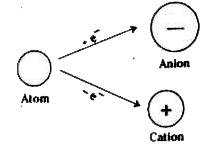Explain why cation is smaller and anion is larger in radii than their parent atoms.Solution in Telugu
When an electron is removed from a neutral atom, cation is formed . The nuclear charge in both the cation and in its parent atom is the same . But the number of electrons in the cation are less than in its parent atom.
Hence, the nuclear attractions, in a cation will be more than in its parent atom. As a result of which the electron colud of cation shrinks. Hence the size of a cation is always smaller then its parent atom.

When an electron is added to a neutral atom, anion is formed. The nuclear change in both the anion and in its parent atom is the same. But, the number of electrons in the anion are more than in its parent atom. Hence the nuclear attractions, in the anion will be less then in its parent atom. As a result of which the electron cloud expands. Hence, the size of anion is always greater than its parent atom.
Similar Questions
Cations are smaller than their parent atom whereas anions are larger in size than their parent atom. Explain.
View SolutionExplain why cation are smaller and anions are larger in radii than their parent atoms?
View Solution(i) The electronic configuration of an atom is one of the important factor which affects the value of ionization potential and electron gain enthalpy. Explain. (ii) Explain why cation are smaller and anions are larger in radii than their parent atoms?
View Solutionसमझाइए, धनायन की अपने जनक परमाणुओं से छोटी त्रिज्याएं होती हैं तथा ऋणायन की इनसे बड़ी त्रिज्याएँ होती हैं।
View SolutionExplain why cations are smaller and anions larger in radii than their parent atoms?
View SolutionExplain why cation are smaller and anions larger in radii than their parent atoms?
View SolutionAnion is ..................... (larger / smaller) than the parent atom where as cation is ................... (larger / smaller) than the parent atom.
View SolutionExplain why cations are smaller and anions larger in radii than their parent atoms?
View Solution
